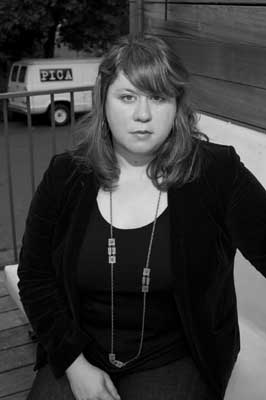The Arts Research Center at UC Berkeley is sponsoring the symposium “Curating People” on April 28 and 29, 2011. Participants have been invited to post some brief thoughts on the topic in advance of the event. This guest posting is by Kristan Kennedy, Visual Arts Curator at the Portland Institute for Contemporary Art.

Confessions of an Artist/Artist-Curator/Curator of Artists
I do not come to this symposium with a pedigree. Somehow through hard work and the investigation of ideas, I have gotten to where I am today. I am an artist who also calls herself a curator. I sit within an institution working on behalf of artists. I also attempt to teach, to write, to arrange objects and humans - in rooms and in theaters and in storefronts and on the street. In my role at PICA I have often said yes. I have rarely had to say no. This feels like a privilege. I want to pass that along to the artists I work with. I want them to feel free to make what they want how they want where they want.
I often have difficult conversations with the community of artists and others that surround me about art and money, and art and meaning, and art and value, and art and community. I use words like “hybrid” and “discursive” and “dialogue” and “ practice” and “ intention”. I often talk about “de-historization” the “current moment” and “ collapsing forms”. I love to put the word “post” in front of everything. I like to think we are post- everything. Sometimes those words sounds right, and sometimes it sounds like the shifty language of the art world and therefore, flawed and contradictory and awful. The not so secret, secret is we are all still looking for the words to describe the now.
Part of the now is the debate over presenting vs. curating, object vs. action, performance vs. performing, plastic vs. live, social practice vs. studio practice. For the most part I like to take the vs. out of the conversation all-together. However, institutional mandates, missions, funding, venue and ego often make that impossible. And as open as I would like to pretend to be, I like sides.
Since this is about confession… I confess that I do not have any of it figured out. I also confess that I hope I never do, and that I always have the luxury of trying to.
I will conclude with this example of me fighting against myself. In an email to my colleagues on the upcoming panel, I said the following…It is also a confession of sorts.
“I do not know the thinking behind the Symposium name “Curating People”. I always imagined it to be a play on words- to get at- the difference between curating people (performances made by people) and curating objects. This brings up similar issues that David Henry talks about so eloquently in his statement. In my world of Visual Art “presenting” there is often a disconnect between the art and the human who made it, especially if we are talking about collecting institutions. Often the human is an afterthought. However, in my life at PICA, regardless of form, we are curating people… not objects. Even the artists who are presenting sculpture with no crossover into other forms no “LIVE” element are still in the room. They are a part of the equation for me, always.
I too am not sure about the title of the panel “When Presenters Become Curators, When Curators Become Presenters” mostly because the word “presenter” seems so corporate and removed from the work we do, although I hear it all the time and know it does not always have those connotations, it still makes me bristle. It is the same reaction I have to putting an “s” after Art - Arts. It is the same way I feel about the distinction between performance art and performing art(s). From my experience it is more the structure and rigidity of the organization and the perceived systems of support.(Collectors vs. Ticket Buying audience. Gallery vs. Theater. ) and of course the curatorial ego that prevent hybrid works from truly succeeding. (well then there is my previous statement, that just because something takes place in the venue of one or another form does not make it hybrid, or as well all know, “good” - this brings up questions of aesthetics and relevance- and craft- virtuosity…) At the same time the obsession with talking about all of the genres collapsing (which may be true in part) does not leave room for things to remain autonomous and connected to a unique history all of it’s own.
I know that was a discursive ramble. I am hoping that it will start to be clear in the moment. The best panel conversations are ones that are allowed to follow their most exciting course, perhaps that is why we should think of a super vague title- then whatever we wind up blabbing about will fit the container.”
The end.
No comments:
Post a Comment